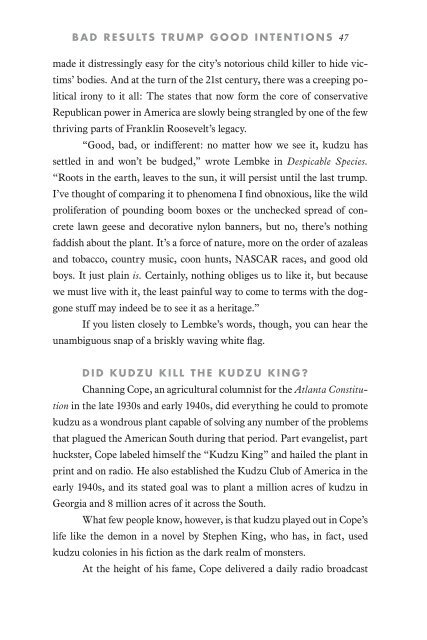the abbreviated reign of “neon” leon spinks
the abbreviated reign of “neon” leon spinks
the abbreviated reign of “neon” leon spinks
You also want an ePaper? Increase the reach of your titles
YUMPU automatically turns print PDFs into web optimized ePapers that Google loves.
BAD RESULTS TRUMP GOOD INTENTIONS 47<br />
made it distressingly easy for <strong>the</strong> city’s notorious child killer to hide vic-<br />
tims’ bodies. And at <strong>the</strong> turn <strong>of</strong> <strong>the</strong> 21st century, <strong>the</strong>re was a creeping po-<br />
litical irony to it all: The states that now form <strong>the</strong> core <strong>of</strong> conservative<br />
Republican power in America are slowly being strangled by one <strong>of</strong> <strong>the</strong> few<br />
thriving parts <strong>of</strong> Franklin Roo sevelt’s legacy.<br />
“Good, bad, or indifferent: no matter how we see it, kudzu has<br />
settled in and won’t be budged,” wrote Lembke in Despicable Species.<br />
“Roots in <strong>the</strong> earth, leaves to <strong>the</strong> sun, it will persist until <strong>the</strong> last trump.<br />
I’ve thought <strong>of</strong> comparing it to phenomena I find obnoxious, like <strong>the</strong> wild<br />
proliferation <strong>of</strong> pounding boom boxes or <strong>the</strong> unchecked spread <strong>of</strong> concrete<br />
lawn geese and decorative nylon banners, but no, <strong>the</strong>re’s nothing<br />
faddish about <strong>the</strong> plant. It’s a force <strong>of</strong> nature, more on <strong>the</strong> order <strong>of</strong> azaleas<br />
and tobacco, country music, coon hunts, NASCAR races, and good old<br />
boys. It just plain is. Certainly, nothing obliges us to like it, but because<br />
we must live with it, <strong>the</strong> least painful way to come to terms with <strong>the</strong> doggone<br />
stuff may indeed be to see it as a heritage.”<br />
If you listen closely to Lembke’s words, though, you can hear <strong>the</strong><br />
unambiguous snap <strong>of</strong> a briskly waving white fl ag.<br />
DID KUDZU KILL THE KUDZU KING?<br />
Channing Cope, an agricultural columnist for <strong>the</strong> Atlanta Constitution<br />
in <strong>the</strong> late 1930s and early 1940s, did everything he could to promote<br />
kudzu as a wondrous plant capable <strong>of</strong> solving any number <strong>of</strong> <strong>the</strong> problems<br />
that plagued <strong>the</strong> American South during that period. Part evangelist, part<br />
huckster, Cope labeled himself <strong>the</strong> “Kudzu King” and hailed <strong>the</strong> plant in<br />
print and on radio. He also established <strong>the</strong> Kudzu Club <strong>of</strong> America in <strong>the</strong><br />
early 1940s, and its stated goal was to plant a million acres <strong>of</strong> kudzu in<br />
Georgia and 8 million acres <strong>of</strong> it across <strong>the</strong> South.<br />
What few people know, however, is that kudzu played out in Cope’s<br />
life like <strong>the</strong> demon in a novel by Stephen King, who has, in fact, used<br />
kudzu colonies in his fiction as <strong>the</strong> dark realm <strong>of</strong> monsters.<br />
At <strong>the</strong> height <strong>of</strong> his fame, Cope delivered a daily radio broadcast



